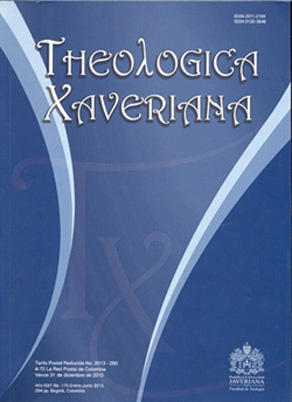Abstract
This paper aims at contributing to the understanding of theology and its relationship to philosophy based on the principal work of H. U. von Balthasar. The analogia entis is the fundamental topic here. This article attempts to scrutinize the purpose of Von Balthasar by studying the diverse quotes by Nicolas de Cusa in the glory, and by establishing his inspiration. The cusan topics of perception, participation and coincidentia oppositorum are analyzed in order to explore his contributions to theology and the theological method. This topic allows for a deeper understanding of human awe for beauty and of their search for loyalty. Adhering to a faith goes hand-in-hand with the God of love kenosis.
This journal is registered under a Creative Commons Attribution 4.0 International Public License. Thus, this work may be reproduced, distributed, and publicly shared in digital format, as long as the names of the authors and Pontificia Universidad Javeriana are acknowledged. Others are allowed to quote, adapt, transform, auto-archive, republish, and create based on this material, for any purpose (even commercial ones), provided the authorship is duly acknowledged, a link to the original work is provided, and it is specified if changes have been made. Pontificia Universidad Javeriana does not hold the rights of published works and the authors are solely responsible for the contents of their works; they keep the moral, intellectual, privacy, and publicity rights.
Approving the intervention of the work (review, copy-editing, translation, layout) and the following outreach, are granted through an use license and not through an assignment of rights. This means the journal and Pontificia Universidad Javeriana cannot be held responsible for any ethical malpractice by the authors. As a consequence of the protection granted by the use license, the journal is not required to publish recantations or modify information already published, unless the errata stems from the editorial management process. Publishing contents in this journal does not generate royalties for contributors.


